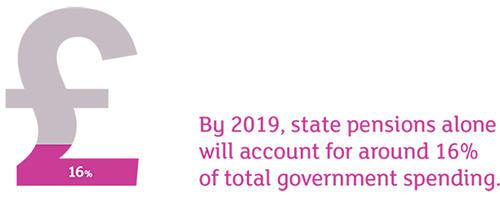Government needs to budget for the medium to long term, invest strategically in growth and invest in early interventions for the benefit of both current and future generations. Policies simply designed to win votes in the short term will only serve to damage the public interest by undermining efforts to remove the deficit and reduce debt.
The UK faces significant demographic pressures in coming years. The Office for National Statistics (ONS) has updated its projections up to 2021 based on the recent release of data from the 2011 Census. In England in 2021, compared to 2011:
- there will be 24% more people aged 65 and over
- there will be 39% more people aged 85 and over.
The ONS has also projected that in England in 2030, compared to 2010:
- there will be 51% more people aged 65 and over
- there will be 101% more people aged 85 and over.
The ONS has set out how, looking further ahead over the next 50-year period, we can expect a doubling of the population in the UK aged over 65, and a very substantial – four times or more – increase in the main projection of those aged 85 and over.
This will have major consequences for other generational cohorts:
- In 2008 there were 3.2 people of working age for every person of pensionable age. By 2033 this will have fallen to 2.8.
- Continuing to provide state benefits and pensions at the current rate will require an additional £10bn per year for every million people over working age.
This rising demand for services for the elderly will make it increasingly difficult to balance their needs against those of other generations, in the context of a largely fixed proportion of national income spent on public services. Generating economic growth will be a key determinant of the size of the spending envelope, and there need to be active policies to stimulate this. At the same time, governments will need to safeguard the existing revenue base, by stopping avoiding politically difficult decisions.
In the case of local property taxes, the tax base is being hollowed out through annual freeze grants and the failure to revalue property.
Future governments will also need to bear in mind the potential risks: in the external environment, such as the fragile state of the Eurozone economy, a potential UK withdrawal from the EU, or a rise in interest rates that could impact negatively both on growth and expenditure.

 Housing Housing |
|
Economic growth, social stability and community are undermined by insufficient good affordable housing provision. The increasing reliance on housing benefit over the last 20 years has seen long term housing investment replaced by short term subsidisation. This imbalance has created a vulnerability that has recently been exposed under welfare reform. ‘There was evidence the Housing Benefit reforms are contributing to increasing levels of homelessness with corresponding serious implications for households and for local authorities’. Large scale partnership developments such as Manchester Life highlight what can be achieved with housing when it is viewed as a long term investment. Greater investment and more innovative financial solutions are central to economic growth.
|
 Pensions Pensions |
|
Economic pressures and government policies have hit the young relatively harder than the old in recent years. Cuts in benefit spending have been wholly focussed on the working age cohort, even though 67% of spending is on those of pension age.
Schemes to win votes from older people, such as the current triple lock on state pension – guaranteeing they will rise by the higher of earnings, prices or 2.5% – will further increase this generational imbalance. Ring-fencing pensioner benefits reduces the ability of the government of the day to manage the many other budgetary pressures effectively, particularly the rising cost of health and social care, which in themselves create pressures both now and for future generations.
|